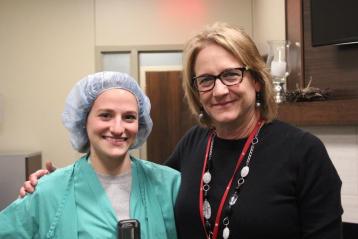
Do you remember how it felt to begin your first job after finishing school? You may have felt uneasy, like you weren’t sure what you were in for. It can be an intimidating experience when a new graduate begins their work in their chosen field. And that’s certainly the case for nurses.
For the new nurses who begin their career at Nebraska Medicine – Nebraska Medical Center or Nebraska Medicine – Bellevue, they often find themselves caring for critically ill patients, right after graduation and completion of their nursing board exams.
That’s why mentorship is a critical component to supporting new nurses and encouraging them when times get tough.
At the Nebraska Medical Center and Bellevue, we have the year-long Vizient (formerly UHC) Nurse Residency Program, which is a requirement for all new nursing graduates.
“In this program, a new graduate is paired with a preceptor for onboarding and training during their orientation,” explains Dawn Straub, executive director, Nursing Professional Practice and Informatics. “During orientation, they have someone by their side and generally, new nurses are comfortable asking questions.”
A nurse’s orientation lasts 12 weeks. Upon conclusion of orientation, new nurses continue to meet monthly with their preceptor, but they begin to work independently. Straub says the 6-month mark is a critical time for a new nurse.
“This is when they can feel intimidated to ask for help. They may feel like they should know the answer. It takes a lot of time for a nurse to feel competent and confident in their practice.”
This is why mentorship is so important, Straub says.
“Many nurses maintain the mentor relationship with their preceptor or go on to develop new ones. Having a mentor can really launch a career and make a nurse feel they have a direction in their practice.”
For Maddie Byers, nurse in Interventional Radiology, she felt fortunate to have a supportive mentor on her shift each night, veteran nurse Cathy Williams. In fact, Williams also mentored her mother, Amy Steinauer, case management nurse, Community and Corporate Relations, when she was a new nurse in the 1980s.
After Byers graduated from UNMC’s College of Nursing in 2013, she began working overnights on the Cardiovascular Intensive Care Unit (CVICU), the same unit her mother began her nursing career.
“I made sure to ask for help when I was unsure of something or just wanted reassurance,” says Byers.
She often found herself turning to Williams who retired last year.
“She was a mama bear to me,” says Byers. “She was the one everyone turned to.”
Byers was able to learn from Williams for one year, before Williams retired.
“I was so sad to see her go, but was very happy for her.”
Byers also felt she had a special connection to Williams because of her mom.
“With Cathy, I could ask her any question.”
For Byers, it was the support of Williams and her fellow new nurses that got her through that first year. And for this mother and daughter, Williams is someone they’ll both never forget.

